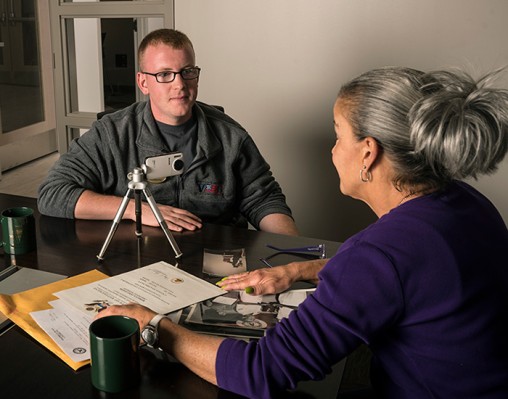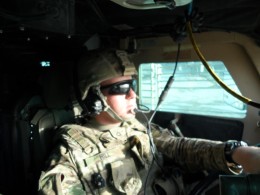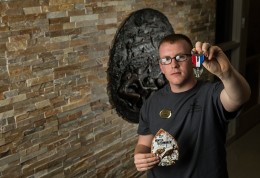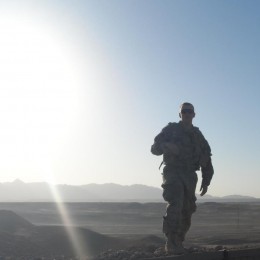
After serving in Afghanistan with the Army Reserve, Wright State student Adrian Hill now coordinates the Veteran and Military Center’s Veterans Voices Project and was recently named to the State of Ohio’s committee on service and volunteerism.
The first time Wright State University student Adrian Hill saw an IED explode it was the largest he would witness during his nine-month tour in Afghanistan.
The massive blast from the 300-pound homemade explosive flipped a British troop truck in his convoy. In just seconds the explosion made it very clear that his Army Reserve company’s mission to locate buried IEDs was as critical as any for U.S. armed forces in the region.
Discipline. Attention to detail. Commitment to service.

Hill driving an armored-up RG-31 in Afghanistan, which included a digital screen that he and others monitored for IEDs.
These were the attributes that would guide Hill’s actions for the duration of his tour in the combat zone on the other side of the world. They were familiar rudders for the Eagle Scout, sergeant and now member of the State of Ohio’s committee on service and volunteerism.
Hill, who works part-time in the Wright State Veteran and Military Center as a coordinator for the Veterans Voices Project, is a perfect fit for the committee that will recommend service and volunteering projects for the state to fund, as well as improvements with new or existing programs.
“In some way, shape or form, I’ve always been inclined toward serving my community,” said Hill. “It’s been a part of much of my life.”
Hill said he first discovered the rewarding nature of community service as a Boy Scout in Tipp City, Ohio. His commitment led to leadership and many community service projects along the way, including an effort to clear a mile-long trail at a nature park in Troy that had been overgrown by honeysuckle and rough terrain.

Hill (center) with mother Michelle Lee at left and sister Allysha Lee at right the day he made Eagle Scout.
“When I did that for my Eagle Scout project I saw how I was able to get people moving on a community service project. There were over 20 people working on it, and we got it done in just a couple weekends,” said Hill. “I think that’s when I realized that this is a powerful thing.”
A few years later, Hill, yearning to serve his country, volunteered for the Army Reserves. It didn’t take long before he was sitting in an RG-31 armored-up vehicle in Helmand Province, Afghanistan, as a combat engineer responsible for spotting IEDs (improvised explosive devices) in advance of troop convoys.
Hill’s attention to detail was critical as he and others watched a monochromatic, digital screen, six by eight inches in size that displayed hazy images under the rugged terrain.
“A camera would be zoomed down, and you’d basically be watching for if you saw anything different or that seemed like it could be something out of the ordinary. Then you’d have to stop immediately so you didn’t set it off,” said Hill.
Wires, plastics and disturbed earth. To the untrained eye, they often didn’t look like much of anything on there little screen, but Hill knew from first-hand experience they could mean everything.
“It was scary. My truck never personally got hit. But the first time I saw one, was the biggest one I ever saw on deployment,” recalled Hill. “We had cleared an area, and whether it was deep buried, or they went off the route we gave them, or we just missed it, I don’t know. But they hit it. They got pretty messed up by that one.”
Hill’s story and others like it are critical in chronicling the experiences of veterans, giving them a chance to talk about what they’ve seen, and giving younger veterans a chance to connect with the generations that came before them. That’s the aim of the Veterans Voices Project.
“Wright State is special in terms of being military friendly. The commitment here is real,” said Hill. “At other schools, other centers, you just turn your paperwork in and that’s it. This veteran’s center here, they give you a helping hand, all the way through. It makes perfect sense that they’d have this project here.”
Wright State is engaged in a $150 million fundraising campaign that promises to further elevate the school’s prominence by expanding scholarships, attracting more top-flight faculty and supporting construction of state-of-the-art facilities. Led by Academy Award-winning actor Tom Hanks and Amanda Wright Lane, great grandniece of university namesakes Wilbur and Orville Wright, more than $107 million has been raised so far.
Hill found his current service opportunity by taking it first as a history class where he learned how to interview veterans from the World War II and Vietnam eras on camera. The videos are later given to the Library of Congress but are also used to promote the project.

Wright State student Adrian Hill was a combat engineer in the Army Reserves responsible for spotting IEDs in Afghanistan.
“The biggest issue is that some of these vets don’t think they really did anything. And that’s something we’re constantly trying to get across: there service was significant. Even if they sat at a desk all day, there was something they did that helped the effort. A lot of guys don’t realize that,” said Hill.
A future high school history teacher, Hill appreciates the significance more than most. He believes his passion for history and determination to serve his country, community and classroom will win students over.
“History is something that so many people just don’t seem to care about. They ask ‘Why should I care?’ I need a good answer for that. I need many good answers for that. And I’ve got them,” Hill said. “You’ve got to keep it interesting and keep it humorous, give them something that matters, that’s a service to them, which I think I can do.”
The State of Ohio agrees.


 Wright State University Foundation awards Students First Fund grants
Wright State University Foundation awards Students First Fund grants  Cosmic collection
Cosmic collection  Wright State revives student-faculty collaborative writing journal
Wright State revives student-faculty collaborative writing journal  Fulfilling dreams
Fulfilling dreams  Wright State alumna Nicole Scherzinger wins top British theatre award as star of ‘Sunset Boulevard’
Wright State alumna Nicole Scherzinger wins top British theatre award as star of ‘Sunset Boulevard’ 